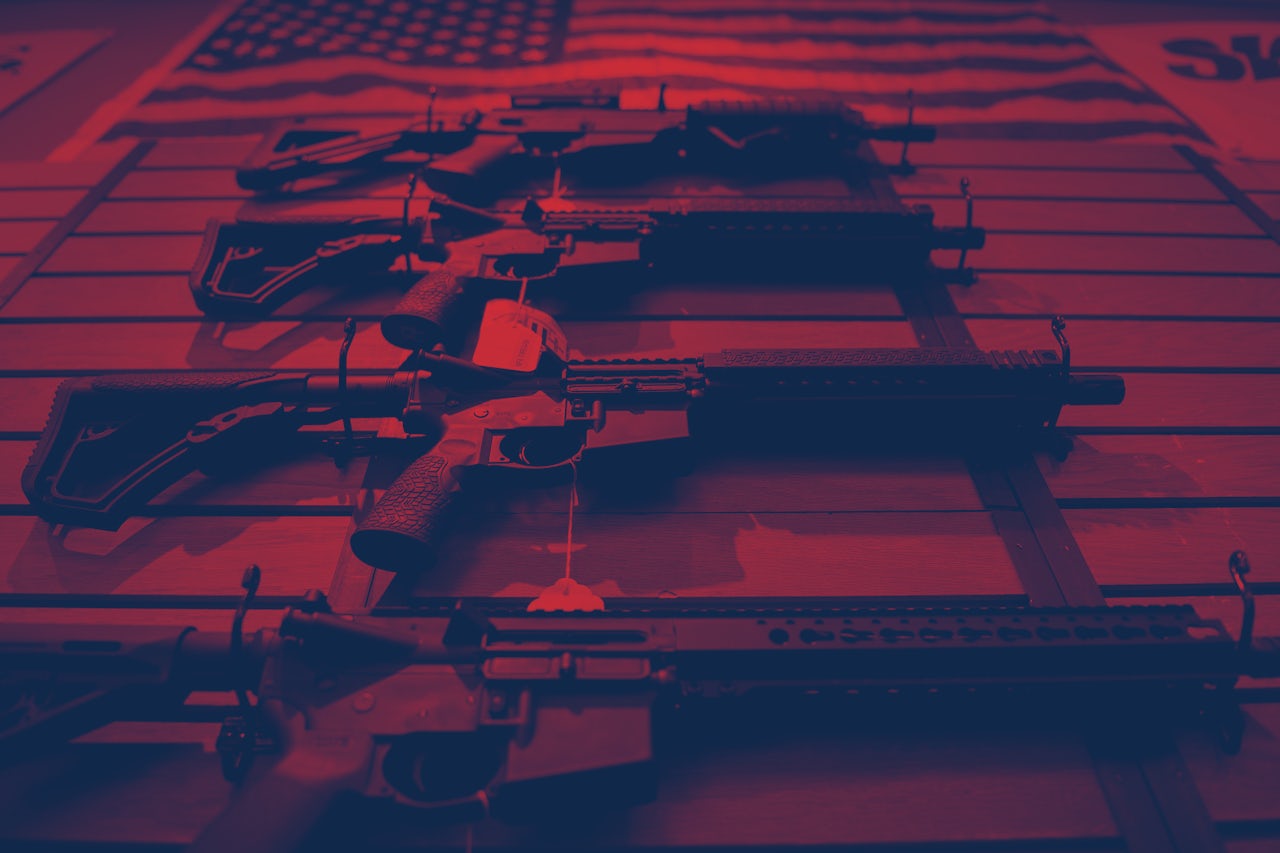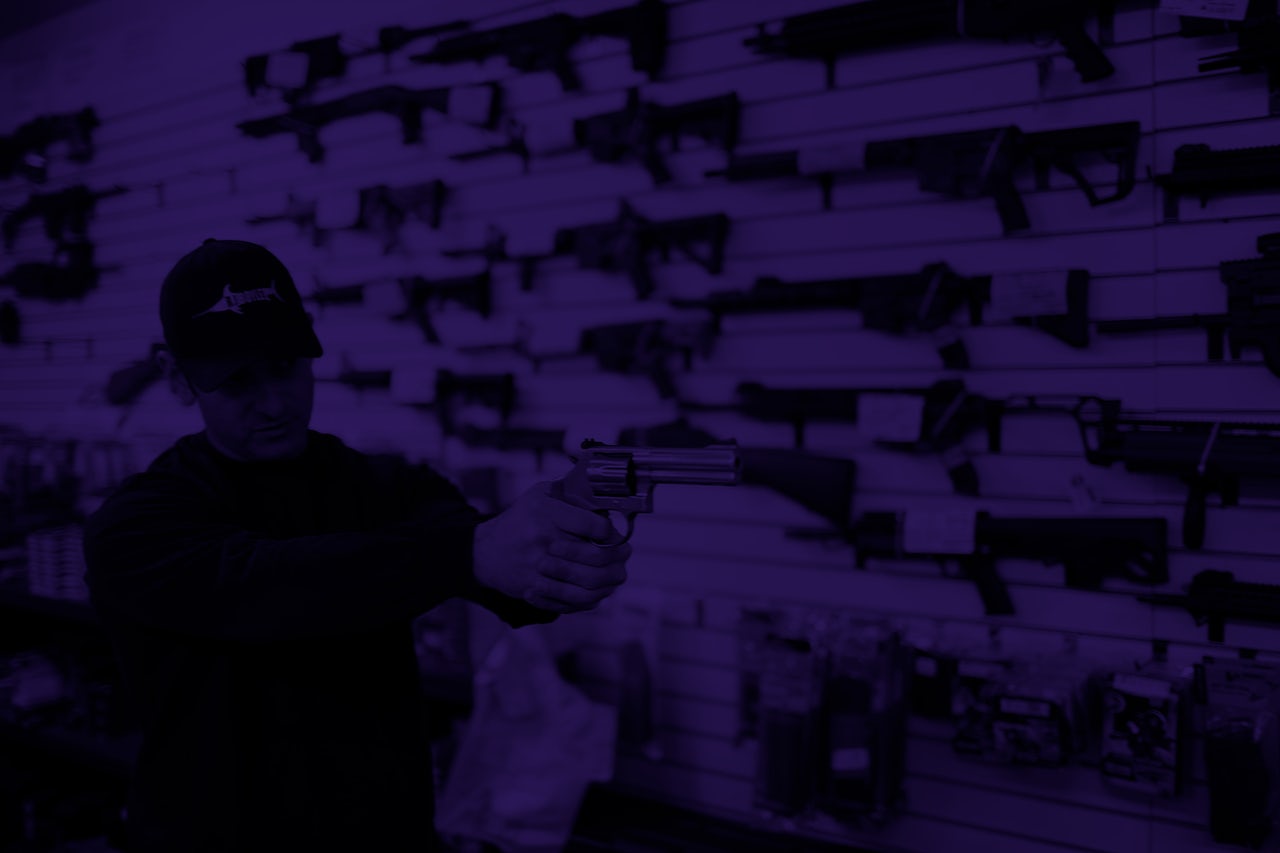When anti-racist protesters held a demonstration against the white supremacist rally in Charlottesville in August, their protest was protected by an informal militia of 20 rifle-toting leftists who surrounded the perimeter of Justice Park. “It’s a deterrent,” Kevin Smith, a member of a leftist gun club who was part of the informal security detail, told the Colorado Springs Independent. “There were people there who wanted to come over and start [fights] with people, but they saw us and stayed across the street.”
“Guns are a necessary form of self-defense so long as there is an oppressive, racist state that exists to uphold white supremacy.”
As Democrats and Republicans debate gun control in the wake of last week’s shooting in Las Vegas, which left 59 dead and more than 500 injured, some socialists and other leftists are rejecting the Democratic Party’s call for stricter regulation of firearms. The result has been a fraught intra-leftist gun debate that raises questions about the efficacy of gun control, as well as the roles racial and economic justice should play in curbing gun violence.
“I would describe myself as a pro-gun socialist,” Courtney Caldwell, told The Outline. Caldwell, an active member of the Denton, Texas chapter of the Democratic Socialists of America, doesn’t quite fit the profile of the average gun owner: white, male, high-income, and over the age of 55, according to a 2015 Columbia University study published in the journal Injury Prevention. For her, gun ownership is a fundamental part of her leftist identity. “Guns are a necessary form of self-defense so long as there is an oppressive, racist state that exists to uphold white supremacy,” Caldwell said. This doesn’t just mean self-defense in the traditional sense — defending one’s body from harm — but also the collective defense of marginalized communities.
Several leftist pro-gun organizations are committed to doing just that. There’s Redneck Revolt, a self-described anti-racist, anti-capitalist grassroots organization that seeks to build solidarity between the white working class and people of color. Founded in 2016, the organization has more than 40 chapters across the country. In addition to providing security at protests, Redneck Revolt relies on counter-recruitment — reclaiming gun culture from white conservatives as a way of reaching out to working-class gun owners who feel alienated from mainstream liberal politics. The Dallas-based Huey P. Newton Gun Club, established in 2013 and named after the founder of the Black Panther Party, was formed in response to right-wing gun advocacy groups in the region. In 2015, the group’s founder Charles Goodson told Vice magazine he wanted his organization to become the “black alternative to the NRA.” But Goodson’s gun club focuses on more than just individual gun ownership. That same year, the club staged its first openly-armed patrol in a predominately black Dallas neighborhood where police killed a young black man in 2012. “No longer will we let the pigs slaughter our brothers and sisters and not say a damn thing about it! Black power! Black power! Black power!” the rally’s leader shouted.
Joe Prince, a law student and black leftist living in Washington D.C., defined his community’s relationship connection to guns as “complex.”
“The relationship is not a loving one, to say the least,” Prince told The Outline. He isn’t a gun-owner himself — “I think guns are terrible. I never want to own a gun,” he said — but understands the appeal gun-ownership has for people of color, and for leftists of color in particular. “Martin Luther King, Jr. owned guns,” Prince said. “He spoke frequently about how much he didn’t like guns, about how nonviolence is the way forward for civil rights, but at the same time he had people with shotguns protecting him so he would be able to live to make those speeches.”
Not all leftists are sold on this idea. “From a pragmatic, realistic standpoint, the first thing we need to remember is that two-thirds of gun deaths — the majority — are suicides,” a socialist writer who goes by the name Lana Del Raytheon told The Outline. Having worked in suicide prevention for six years, Del Raytheon’s main concern is the correlation between gun ownership and suicide rates. “There is something to be said about hypothetical situations and preparing for those, but at the same time, what is the real cost of having a gun in your home to prepare for something that will never happen? Once you have a gun in your home, your chances of suicide or of killing an intimate partner skyrocket.”
The leftists I spoke to all agree that the Democratic Party’s focus on mass shootings ��� tragic incidents which nonetheless account for a minority of gun deaths — shifts the focus from the root causes of gun violence in America.
Homicides account for just a third of gun deaths, and research suggests that these deaths in particular tend to be tied to socioeconomic status. As the Atlantic reported in 2011, there’s a positive correlation between gun homicides and poverty. A recent report by Demos, a left-wing think tank, found that a massive disparity exists between the wealth of black and white households in the U.S. The racial wealth gap is so pervasive that the median white household led by a high-school dropout is wealthier than the median black household headed by someone with a college education. According to data from the Economic Policy Institute, the median net worth for white families was $134,230 in 2013, compared to $11,030 for black families. Mark Kaplan, a professor of social welfare at the UCLA Luskin School of Public Affairs who studies suicide and gun deaths, found that 77 percent of white gun deaths are suicides while 19 percent are homicides. Among black Americans, 14 percent of gun deaths are suicides and 86 percent are homicides, numbers that are hard to separate from the starkly disparate household income statistics. In his research, Kaplan found that countries with more income parity tend to have lower rates of gun-related deaths.
“When they enforce [gun] laws, will black youth be safe from arbitrary punishment for gun laws? Will they mostly target black youth?”
Despite their differing views on guns and gun control, the people I spoke with all agreed on one thing: Politicians looking to curb the gun violence epidemic, particularly in low-income communities and communities of color, should focus on education and economic equality rather than on punitive gun control legislation. If gun control legislation passes, Prince asked, “Will the police be disarmed [too]? Do we trust the government to make sure black people are safe from threats, from terrorism from white nationalists? When they enforce [gun] laws, will black youth be safe from arbitrary punishment for gun laws? Will they mostly target black youth?”
“We know that so many vectors of interpersonal violence are related — from our alienation due to capitalism, and also from the allostatic load, the elevated stress levels from dealing with racism, dealing with patriarchy, and other kinds of systemic oppression,” Del Raytheon said. “[Policies] that can address that would be a really good start in preventing gun homicides without really targeting people of color or lower-income people and putting them through the carceral state.”
The effects of reactionary gun legislation are a concern even for those who generally support stricter gun enforcement. Scott Hechinger, senior staff attorney at Brooklyn Defender Services, told The Outline that in the wake of mass shootings and other violent, tragic incidents, resulting legislation tends to disproportionately affect low-income people and people of color. “Historically, when we have problems — addiction, mental illness, drugs, real crime — our politicians’ instinctual reaction is to try and solve these problems really cleanly and simply with harsh criminal laws,” Hechinger said.
“Once guns are found in people’s hands, we’ve got to think about what the best and most rational approach is to solving that problem,” Hechinger said. “Is it locking them up [in jail], only to have them come out two, three years later than when they came in? Do we want safer communities, or do we want to penalize communities?”
Politicians are rightly concerned with implementing legislation that will prevent other mass shootings from happening. The Washington Post found that nearly 1,000 Americans have died in 131 mass shootings since 1966. Nonetheless, mass shootings account for a tiny sliver of the 33,000 gun deaths that occur in the U.S. each year — and, as Hechinger points out, criminalizing gun ownership does little more than further destabilize communities already plagued by gun violence. The Democratic Party is beginning to embrace policies like single-payer healthcare, a $15 an hour minimum wage, and affordable university tuition, but it’s time to recognize how important these strategies, which may seem unrelated to curbing gun violence, are to addressing its root cause: poverty.

